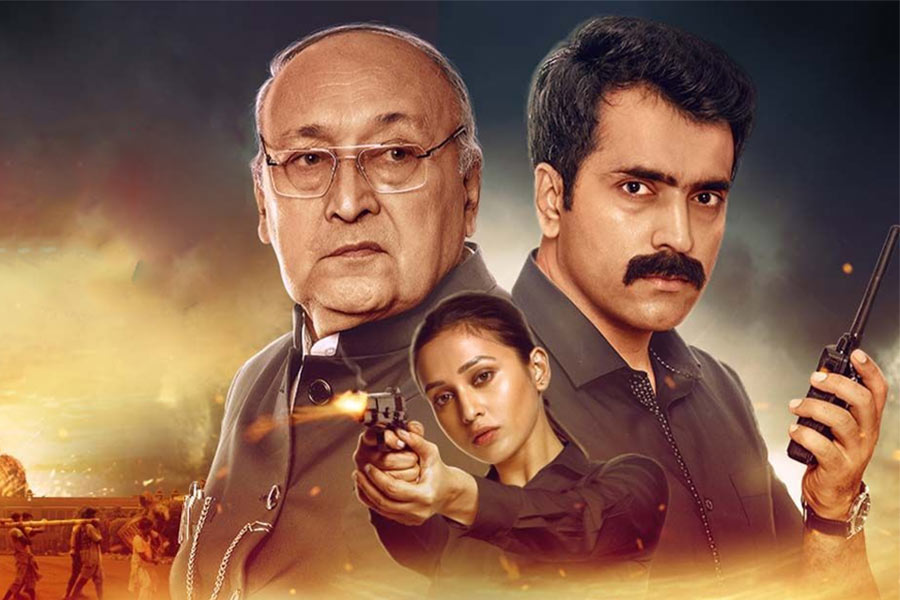The President of India refuses to sign a mercy petition for a terrorist on death row. The man is hanged. Soon after, a bomb goes off in a house in rural Bengal. With Durga Puja round the corner, the state police is thrown into a tizzy when it turns out that the house was in all likelihood being used as an arms arsenal. Two women – Amina Bibi and Husna – are arrested. As the central investigative authorities are called in, what unravels is an elaborate plan by a group of terrorists to avenge their slain comrade.
Nothing about this synopsis spells a Shiboprosad Mukherjee-Nandita Roy film. Over the last decade-and-a-half, this remarkable duo have emerged as directors with a Midas touch, exploring socially relevant subjects that have primarily addressed the family constituency. Theirs is an aesthetic that goes for the emotional, often sentimental, jugular. Be it Haami or its sequel Haami 2, Kontho, Praktan or Posto, and the insanely successful Belaseshe or Belashuru, their films have more often than not originated from newspaper and magazine stories which they have then engineered into a narrative palatable to the middle class, operating firmly within the framework of the melodramatic (I use the term not in a disparaging manner) family social. No one can accuse them of anything even remotely sensational or political in the content of their films.
All this makes Raktabeej – with its strong political undertones and thriller tropes – an outlier in their filmography. Animesh (Victor Banerjee) is coming home for the Puja in his ancestral place in Bengal. A few days before the President’s arrival, a bomb goes off in a house in the vicinity of his village. State police officer Sanjukta Mitra (Mimi Chakraborty) and inspector-general Pankaj Sinha (Abir Chatterjee) of the central investigative agency are assigned to the case.
As the President arrives, we are introduced to the ensemble of characters in his household, including his elder sister Gowri (Anasuya Majumdar). The police grope their way through the investigation, the needle of suspicion starts pointing to the possible involvement of members of the presidential household, and in the best tradition of a thriller, the filmmakers provide us with a Durga Puja countdown – from Mahalaya right down to the climax that is to unfold on Dashami.
Given the scourge of terrorist hideouts popping up all over rural Bengal – a police office (played by Kanchan Mullick) even calls it a cottage industry – and the press coverage of the same, the filmmakers seem to have hit upon the right idea yet again. However, this time round the treatment falls short. Devoid of the often-overwrought familial tropes of their earlier films and unsure of how to address the political undertones of the subject, the film often falls between two stools. Despite the extended presidential family entourage and the short flashback breakaways that give a background to the brother-sister relationship, there is a surprising lack of emotional heft in the narrative. And for a political thriller, the pace is too languid.
Whatever momentum the film manages to conjure in the first half is dissipated soon enough with two almost back-to-back song sequences in the second, including a redundant item number, ‘Gobindo daant maaje na’. Then there is the ill-fitting romantic angle to the Sanjukta-Pankaj relationship. With all this coming up in the closing stages of the film, the well-shot climax with its good background music build-up fails to deliver because by that time, the film has lost me. And that final twist takes recourse to a deus ex machina that is as unconvincing as it is amateurish.
This could have been an important film on state violence (a terrorist being hanged) begetting communal violence (the mayhem being planned in retaliation) and the need for forgiveness. Animesh and Gowri argue on this point too, with Gowri bringing up the Bhagavad Gita in defence of her arguments, only to have her brother counter that even Lord Krishna did not forgive his adversaries. There’s also the backstory of Animesh as a child trying to protect a goat from being sacrificed, contrasting that with his avatar as a President whose one signature can spell death for a man.
Then there’s the mention of the mythological ‘raktabeej’ legend involving the goddesses Kaushiki and Kali, and how a drop of blood shed only acts as the seed for more bloodshed. Though the juxtaposition of the devi’s chants with a jihadi’s indoctrination of children or the symbolic sacrifice at the altar of the goddess with the killing of a terrorist is rather discomfiting in the current social and political scenario, there are pertinent issues in the film that could have done with more focused treatment.
Hopefully, the sequel – from the way the film ends one looks like very much in the offing, with Pankaj Sinha even mentioning in one of the many post-climactic epilogues that a revisit to the village might be necessary – will address these lacunae and give us a film that works both as a political thriller and a social statement.
(Shantanu Ray Chaudhuri is a film and music buff, editor, publisher, film critic and writer)










